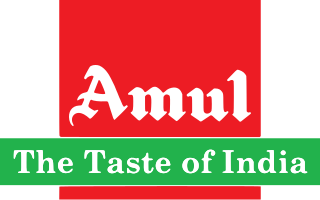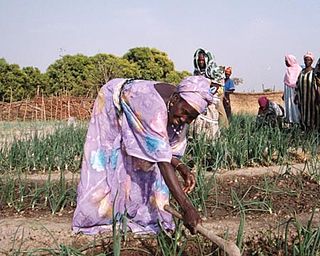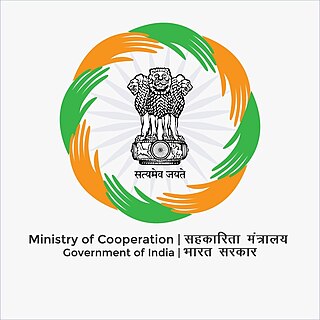
Amul is an acronym of the Indian Multinational cooperative society named Gujarat Milk Marketing Federation based in Anand, Gujarat. It is under the ownership of Gujarat Cooperative Milk Marketing Federation Limited, Department of Cooperation, Government of Gujarat. It is controlled by 3.6 million milk producers.

Verghese Kurien was an Indian dairy engineer and social entrepreneur who led initiatives that contributed to the extensive increase in milk production termed the White Revolution.

The National Dairy Development Board (NDDB) is a statutory body set up by an Act of the Parliament of India and an Institution of National Importance. It is under the ownership of the Ministry of Fisheries, Animal Husbandry and Dairying of the Government of India. The main office is in Anand, Gujarat with regional offices throughout the country. NDDB's subsidiaries include Indian Dairy Machinery Company Ltd (IDMC), Mother Dairy and Indian Immunologicals Limited, Hyderabad, NDDB Dairy Services, NDDB Mrida Ltd., NDDB CALF Ltd. The Board was created to finance and support producer-owned and controlled organisations. Its programmes and activities seek to strengthen farmer cooperatives and support national policies that are favourable to the growth of such institutions. Cooperative principles and cooperative strategies are fundamental to the board's efforts.

An agricultural cooperative, also known as a farmers' co-op, is a producer cooperative in which farmers pool their resources in certain areas of activities.

The National Bank for Agriculture and Rural Development (NABARD) is an All India Financial Institution (AIFI) and an apex Supervisory Body for overall supervision of Regional Rural Banks, State Cooperative Banks and District Central Cooperative Banks in India. It was established under the NABARD Act 1981 passed by the Parliament of India. It is fully owned by Government of India and functions under the Department of Financial Services (DFS) under the Ministry of Finance.

The Kerala Co-operative Milk Marketing Federation (KCMMF), known by its trade name Milma, is a state government cooperative society established in 1980 headquartered in Thiruvananthapuram. It is a state government cooperative owned by the Ministry of Cooperation, Government of Kerala. KCMMF is a Federation of three Regional Milk Unions: the ERCMPU, TRCMPU and MRCMPU.

REC Limited, formerly Rural Electrification Corporation Limited, of which Power Finance Corporation Limited (PFC) is the holding company of that is under the ownership of the Ministry of Power, the Government of India. It finances and promotes power projects across India. The PSU provides loans to Central/State Sector Power Utilities in the country, State Electricity Boards, Rural Electric Cooperatives, NGOs and Private Power Developers. On 20 March 2019, PFC signed an agreement to acquire a 52.63% controlling stake in REC for ₹14,500 crore (US$1.7 billion). On 28 March, PFC announced that it had completed making the payment for the acquisition and intended to merge REC with itself in 2020. However, REC has maintained that merging PFC-REC is no longer an option.

The Department of Co-operation, Food and Consumer Protection of state of Tamil Nadu is one of the departments of Government of Tamil Nadu.
The cooperative movement in India plays a crucial role in the agricultural sector, banking and housing. The history of cooperatives in India is more than a hundred years old. Cooperatives developed very rapidly after Indian independence. According to an estimate, more than half a million cooperative societies are active in the country. Many cooperative societies, particularly in rural areas, increase political participation and are used as a stepping stone by aspiring politicians.
The National Cooperative Development Corporation (NCDC) is a statutory Corporation set up under an Act of Indian Parliament on 13 March 1963. The objectives of NCDC are planning and promoting programmes for production, processing, marketing, storage, export and import of agricultural produce, foodstuffs, industrial goods, livestock and certain other notified commodities and services on cooperative principles and for matters concerned therewith or incidental thereto.

Horticultural Producers' Cooperative Marketing and Processing Society, popularly known by its acronym, HOPCOMS, is a farmers' society founded in 1965 for the direct marketing of farm produces. The society is headquartered in Lalbagh, Bengaluru, in the south Indian state of Karnataka and its activities are spread in the districts of Bangalore Urban, Bangalore Rural, Kolar, Ramanagar, Mandya, Mysuru and Chikkaballapura.

Banas Dairy is a division of Gujarat Cooperative Milk Marketing Federation which is under the ownership of Ministry of Cooperation, Government of Gujarat based in the Banaskantha district of Gujarat, India and is Asia's largest milk producer. It was founded in 1969, in accordance with the 1961 rule of the National Dairy Development Board under Operation Flood. Galbabhai Nanjibhai Patel played an important role in the foundation of the dairy. It is headquartered at Palanpur.
The minimum support price (MSP) is the minimum price for select crops raised in kharif and rabi seasons that the Government of India considers as remunerative for farmers and hence deserves support. This is different from procurement price and issue price. It is generally announced before the sowing/planting season. It is approved by the government and aims to safeguard the farmer to a minimum profit for the harvest while at the same time increasing food security in the country. MSP was initially an incentive for farmers to adopt technology with an aim of increasing the productivity of agricultural land in the 1960s, however in the 2000s it is seen as a market intervention and farmer income scheme. The effectiveness of such a price policy has varied widely between states and commodities. Awareness among farmers of the existence of an MSP is poor at 23%, while awareness of MSP procurement agencies is also poor with only about 20–25% of wheat and paddy produce being sold at MSP.

MSTC Limited is a central public sector undertakings under the Ministry of Steel, Government of India. It is involved in diversified e-commerce services. Its corporate office is in Kolkata, West Bengal with regional branch offices in various other cities. The company reported a net profit of INR 112.95 crore for fiscal year 2020-21. Incorporated on 9 September 1964, MSTC has 344 employees.
Operation Greens is a project approved by the Ministry of Food Processing Industries with the target to stabilise the supply of tomato, onion and potato crops in India, as well as to ensure their availability around the country, year-round without price volatility. It was first introduced in the 2018-2019 Union budget of India, and has been allocated Rs 500 crores to promote farmer producers' organisations (FPOs), agri-logistics, processing facilities and professional management.
Tribal Co-operative Marketing Development Federation of India (TRIFED) is a national level cooperative body under the administrative control of Ministry of Tribal Affairs, Government of India. It was established under the Multi-state co-operative societies act 1984 under the former Ministry of Welfare. Later it came under the control of Ministry of Tribal affairs. In order to empower the downtrodden tribal community it started the procurement of tribal art and craft items firstly in 1999 through its retail outlet called Tribes India.
The Department of Agriculture and Farmers' Welfare (DA&FW) is one of the three constituent department of Ministry of Agriculture and Farmers' Welfare, the other two being Department of Agriculture Research and Education (DARE) and Department of Animal Husbandry and Dairying. The Department is headed by Minister of Agriculture and Farmers' Welfare.
Punjab Agri Export Corporation Limited (PAGREXCO) is a government enterprise established by the Government of Punjab in the year 1997 as the nodal agency for agricultural export from the state of Punjab, India. The company works for export of fresh and processed agricultural produce, infrastructural development and policy implementation in the state. It is a subsidiary of Punjab Agro Industries Corporation. The company has been awarded Sustainable Development Goals Action Award by the Punjab Planning Department for Sustainable Organic Production and Innovative Marketing System. It has also received Leadership award in Agriculture Marketing.

The Ministry of Cooperation is a Union ministry under the Government of India which was formed in 2021. The ministry provides a separate administrative, legal and policy framework for strengthening the cooperative movement in the country. The ministry's creation was announced on 6 July 2021 along with its vision statement of Sahkar se samriddhi. Before the creation of this ministry, the objectives of this ministry were looked after by the Ministry of Agriculture.
The Prime Minister's Farmer Income Protection Scheme, also known as PM AASHA (पीएम-आशा) is an umbrella scheme of the Government of India announced in September 2018 to ensure a price policies such as a minimum support price are fulfilled. It includes the former Price Support Scheme (PSS), a Price Deficiency Payment Scheme (PDPS) and a Private Procurement & Stockist Scheme (PPPS).












